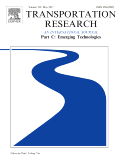 Maëlle Zimmermann, Oskar Blom Västberg, Emma Frejinger, Anders Karlström
Maëlle Zimmermann, Oskar Blom Västberg, Emma Frejinger, Anders Karlström
Capturing correlation with a mixed recursive logit model for activity-travel scheduling
Transportation Research Part C, 93:73-291, 2018
-
Highlights:
- Combining recursive logit with mixed logit framework for activity-based modeling.
- Model estimated on real size application within reasonable time.
- Confirmed improved out-of-sample fit.
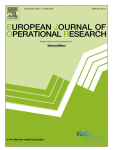 Serena Mantovani, Gianluca Morganti, Nitish Umang, Teodor Gabriel Crainic, Emma Frejinger, Eric Larsen
Serena Mantovani, Gianluca Morganti, Nitish Umang, Teodor Gabriel Crainic, Emma Frejinger, Eric Larsen
The load planning problem for double-stack intermodal trains
European Journal of Operational Research, 267(1):107-119, 2018
-
Highlights:
- We deal with a multitude of railcars and container types through loading patterns.
- We solve large instance in reasonable time using a commercial solver.
- Numerical results are for the North American market.
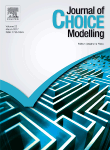 Tien Mai, Fabian Bastin, Emma Frejinger
Tien Mai, Fabian Bastin, Emma Frejinger
On the similarities between random regret minimization and mother logit: the case of recursive route choice models
Journal of Choice Modeling, 23C:21-33, 2017
-
Highlights:
- Link-based route choice models (no path choice set generation).
- We formulate random regret-based recursive logit models.
- Two new specifications of the random regret functions.
- New mother logit models that are equivalent to the regret-based models.
- Estimation and cross-validation results using real data.
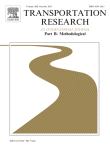 Tien Mai, Emma Frejinger, Morgens Fosgerau, Fabian Bastin
Tien Mai, Emma Frejinger, Morgens Fosgerau, Fabian Bastin
A dynamic programming approach for quickly estimating large network-based MEV models
Transportation Research Part B 98(1):179-197, 2017
-
Highlights:
- A new approach for quickly estimating MEV models with large choice sets.
- MEV models are formulated as dynamic discrete choice models.
- The dynamic models generalize the network MEV and are consistent with MEV theory.
- Estimation using the concept of network flows and the nested fixed point algorithm.
- Numerical results based on simulated and real data.
 Maëlle Zimmermann, Tien Mai, Emma Frejinger
Maëlle Zimmermann, Tien Mai, Emma Frejinger
Bike route choice modeling using GPS data without choice sets of paths
Transportation Research Part C, 75(1):183-196, 2017
-
Highlights:
- Model estimated and validated using bike GPS data on network of 40,000 links.
- Quick computation of link flows without choice set generation.
- Easy to compute accessibility measure with desirable properties.
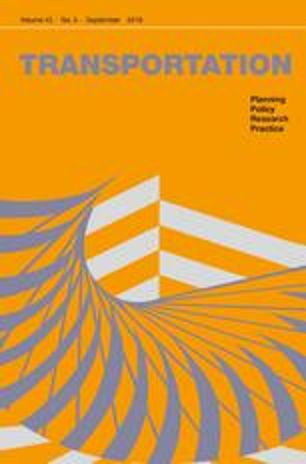 Shiva Habibi, Emma Frejinger, Marcus Sundberg
Shiva Habibi, Emma Frejinger, Marcus Sundberg
An empirical study on aggregation of alternatives and its influence on prediction in car type choice models
Transportation (2017). https://doi.org/10.1007/s11116-017-9828-5
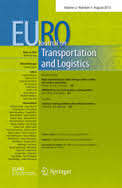 Tien Mai, Fabian Bastin, Emma Frejinger
Tien Mai, Fabian Bastin, Emma Frejinger
A decomposition method for estimating recursive logit based route choice models
Euro J Transp Logist (2016). doi:10.1007/s13676-016-0102-3
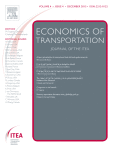 Tien Mai, Emma Frejinger, Fabian Bastin
Tien Mai, Emma Frejinger, Fabian Bastin
A misspecification test for logit-based route choice models
Economics of Transportation 4(4):215-226, 2015.
-
Highlights:
- We show how White's information matrix test can be applied to route choice models.
- Results for path-based and link-based (recursive logit) models.
- Comparison of information matrix and IIA and McFadden–Train Lagrange multiplier tests.
- Monte Carlo experiment results assess the size and power of the tests.
- Path-based and link-based models are strongly rejected when applied to real data.
 Tien Mai, Mogens Fosgerau, Emma Frejinger
Tien Mai, Mogens Fosgerau, Emma Frejinger
A nested recursive logit model for route choice analysis
Transportation Research Part B 75(1):100-112, 2015
-
Highlights:
- The IIA property is relaxed and random terms are correlated.
- Link-based model: no choice sets of paths are required.
- Efficient estimation and prediction.
- Estimation and cross-validation results using real data.
 Mogens Fosgerau, Emma Frejinger, Anders Karlstrom
Mogens Fosgerau, Emma Frejinger, Anders Karlstrom
A link based network route choice model with unrestricted choice set
Transportation Research Part B 56(1):70-80, 2013
-
Highlights:
- A model for the choice of route in a network.
- Link size attribute: a deterministic correction for correlation.
- No choice set generation needed.
- A dynamic specification of sequential link choices is equivalent to a static logit model.
ARTICLES SOUMIS
Hewitt, M., Frejinger, E. Data-driven Optimization Model Customization, soumis à Management Science.
Zimmermann, M., Frejinger, E., Marcotte, P. A strategic Markovian traffic equilibrium model for capacitated networks, soumis à Transportation Science.



